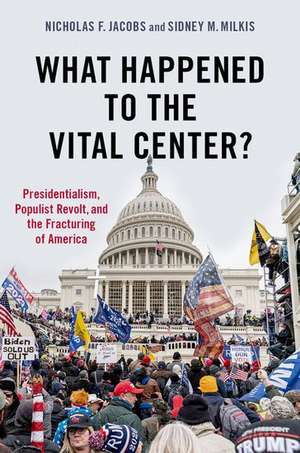What Happened to the Vital Center?: Presidentialism, Populist Revolt, and the Fracturing of America
Autor Nicholas Jacobs, Sidney Milkisen Limba Engleză Paperback – 29 apr 2022
Preț: 166.80 lei
Preț vechi: 179.07 lei
-7% Nou
Puncte Express: 250
Preț estimativ în valută:
31.93€ • 34.69$ • 26.84£
31.93€ • 34.69$ • 26.84£
Carte disponibilă
Livrare economică 20-26 martie
Preluare comenzi: 021 569.72.76
Specificații
ISBN-13: 9780197603529
ISBN-10: 0197603521
Pagini: 384
Dimensiuni: 236 x 156 x 26 mm
Greutate: 0.55 kg
Editura: Oxford University Press
Colecția OUP USA
Locul publicării:New York, United States
ISBN-10: 0197603521
Pagini: 384
Dimensiuni: 236 x 156 x 26 mm
Greutate: 0.55 kg
Editura: Oxford University Press
Colecția OUP USA
Locul publicării:New York, United States
Recenzii
For anyone wanting to understand the institutional history backlighting the rise of populism in America, this is an invaluable book.
This provocative book combines a stark warning and a roadmap for the revival of the 'vital center' in American party politics. But this is no pot-boiler written for the political moment; drawing on deep historical knowledge and rich theoretical acumen, Jacobs and Milkis warn Americans of the dangers of executive-centered partisanship in the presence of weakened party organizations. Their book charts a sane and doable path to assure the future of our embattled democracy.
This book is an altogether impressive achievement—a work of impressive historical sweep and pointed analytical acuity, a bold and compelling reinterpretation of American political development. Jacobs and Milkis brilliantly illuminate the roots of the weakness of the American party system, the rise of a corrosive brand of populism, and the contemporary distemper of American democracy.
Through a rich historical analysis, Jacobs and Milkis detail the pathologies of a politics dominated by the battle for control of an increasingly empowered presidency. Steering a path between an airy romanticism and a narrow realism, they make an eloquent case for a reinvigorated party system.
Milkis and Jacobs argue that America once had responsible parties that tempered both executive power and populist passions and thereby served genuine democratic self-governance. What went wrong? Can it be fixed? Jacobs and Milkis offer valuable insights into these vital questions about America's once-vital center.
This provocative book combines a stark warning and a roadmap for the revival of the 'vital center' in American party politics. But this is no pot-boiler written for the political moment; drawing on deep historical knowledge and rich theoretical acumen, Jacobs and Milkis warn Americans of the dangers of executive-centered partisanship in the presence of weakened party organizations. Their book charts a sane and doable path to assure the future of our embattled democracy.
This book is an altogether impressive achievement—a work of impressive historical sweep and pointed analytical acuity, a bold and compelling reinterpretation of American political development. Jacobs and Milkis brilliantly illuminate the roots of the weakness of the American party system, the rise of a corrosive brand of populism, and the contemporary distemper of American democracy.
Through a rich historical analysis, Jacobs and Milkis detail the pathologies of a politics dominated by the battle for control of an increasingly empowered presidency. Steering a path between an airy romanticism and a narrow realism, they make an eloquent case for a reinvigorated party system.
Milkis and Jacobs argue that America once had responsible parties that tempered both executive power and populist passions and thereby served genuine democratic self-governance. What went wrong? Can it be fixed? Jacobs and Milkis offer valuable insights into these vital questions about America's once-vital center.
Notă biografică
Nicholas F. Jacobs is an Assistant Professor at Colby College, where he teaches in the Government Department.Sidney M. Milkis is the White Burkett Miller Professor in the Department of Politics and a Faculty Fellow at the Miller Center at the University of Virginia.
